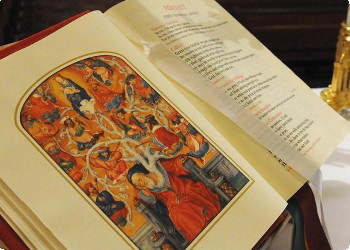Was John’s baptism of heavenly or of human origin?
1 JUNE (Mk 11,27-33)
Jesus enters Jerusalem acclaimed by all the people as their Messiah. But he enters the temple and reveals himself as a true prophet of the living God. He drives out of the house of the Lord, those who made a market of it. The house of God is holy.
They came to Jerusalem, and on entering the temple area he began to drive out those selling and buying there. He overturned the tables of the money changers and the seats of those who were selling doves. He did not permit anyone to carry anything through the temple area. Then he taught them saying, “Is it not written: ‘My house shall be called a house of prayer for all peoples’? But you have made it a den of thieves.” The chief priests and the scribes came to hear of it and were seeking a way to put him to death, yet they feared him because the whole crowd was astonished at his teaching. When evening came, they went out of the city (Mk 11,15-19).
The prophets are sent to re-establish the truth in the hearts of man’s relationship with his God The truth is from the Word of God, not from the cult. The cult is used to return to the lost truth. On the contrary, if the cult is used to seal the loss of our truth, then it is simply a false one. It is a vain, sinful worship, because it is a certifier of the falsehood and deceit of man towards his Lord and God.
Chief priests, scribes and elders see Jesus who proclaims and reveals himself as a true prophet of the living God. They ask him to know who invested him with such an authority of a prophet. They ignore that the prophet comes directly from God. There is prophetic investiture if not from the Lord and the Lord invests him by sending him and putting on his lips the word of truth, justice, holiness, faithfulness, love, forgiveness, mercy and conversion. You should never ask a true prophet the source of his authority. This is always from God in a direct and never indirect way, because it is also the Lord who must directly lay the Words of truth in the mouth of his prophet.
They returned once more to Jerusalem. As he was walking in the temple area, the chief priests, the scribes, and the elders approached him and said to him, “By what authority are you doing these things? Or who gave you this authority to do them?” Jesus said to them, “I shall ask you one question. Answer me, and I will tell you by what authority I do these things. Was John’s baptism of heavenly or of human origin? Answer me.” They discussed this among themselves and said, “If we say, ‘Of heavenly origin,’ he will say, ‘(Then) why did you not believe him?’ But shall we say, ‘Of human origin’?” – they feared the crowd, for they all thought John really was a prophet. So they said to Jesus in reply, “We do not know.” Then Jesus said to them, “Neither shall I tell you by what authority I do these things.”
Jesus cannot answer directly. The atmosphere is rather hot. Knowing the historical moments is something essential and vital for who must live such a high mission, without exposing it to the risk of its failure. He resorts to a trick. He comes to terms with them. He will answer, if they will. If they will not answer, neither will he answer. Did the baptism of John come from heaven or from men? Who asks questions, he must also be able to know how to read the answers. Are those who interrogate Jesus capable of a sapiential reading? It will be known by the answer they give. It is evident that the baptism of John comes from heaven, because John is a man sent from heaven.
Chief priests, scribes and elders consult themselves. For them it becomes difficult to give an answer. The risk is very high. Their prestige and their glory are at stake. That is why they simply say they do not know it. In this answer there is the negation of their own ministry. It is as if to an elementary school teacher a book of first class were presented and he would say: “I do not know how to read. I know neither consonants nor vowels and above all I do not even know to put them together to form a single word.” Such a master certainly attests to not be a master. He is everything but a teacher. The same is for these people. They attest to simply be useless as the teaching of the divine truth. Jesus does not answer them by saying of not knowing, but of not wanting to tell them the source of his authority. He knows, but does not reveal it.
Virgin Mary, Mother of the Redemption, Angels and Saints make us good teachers of the Word.





